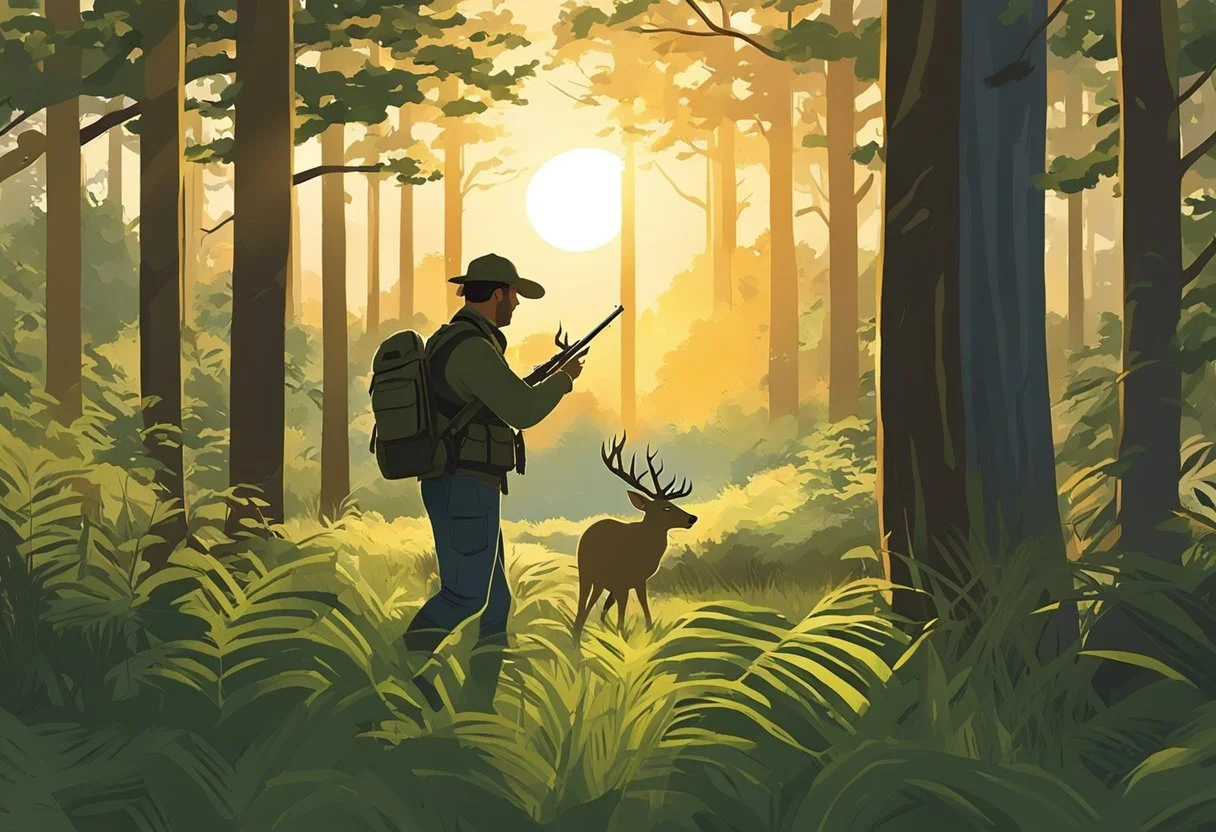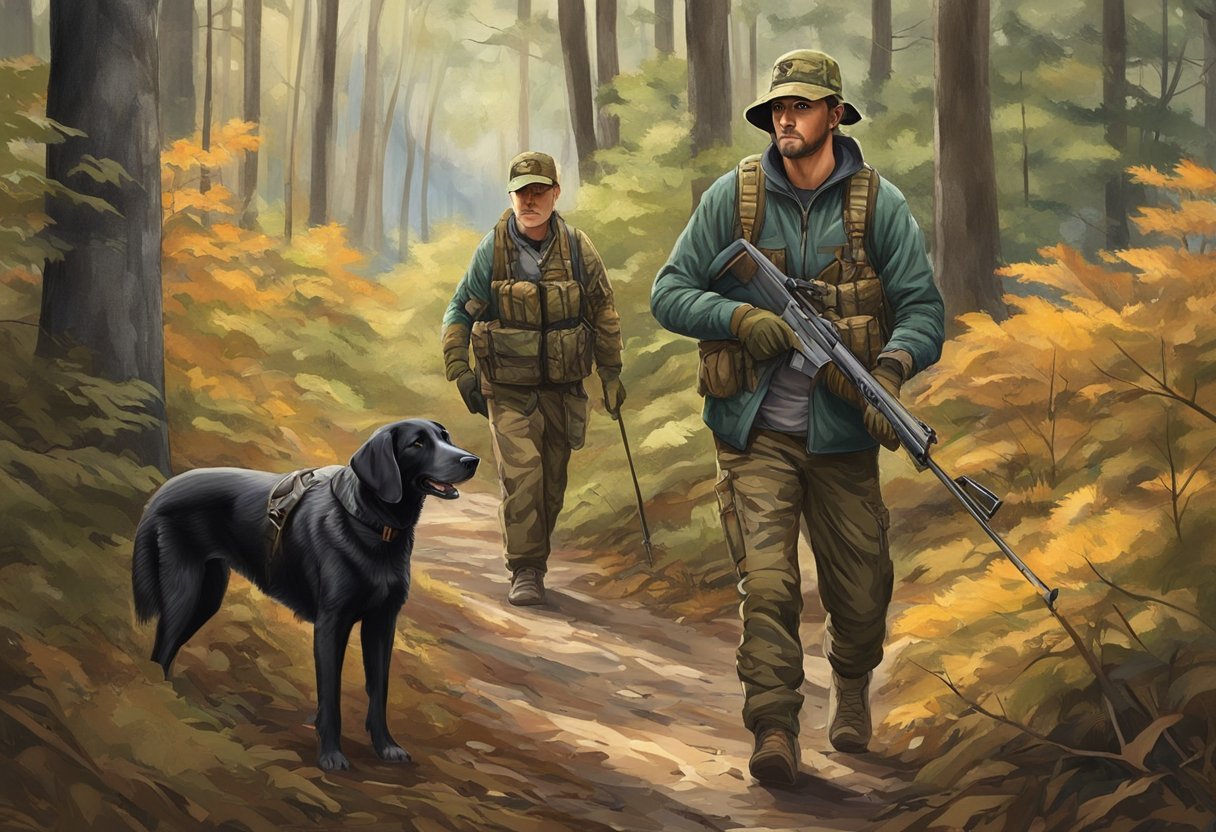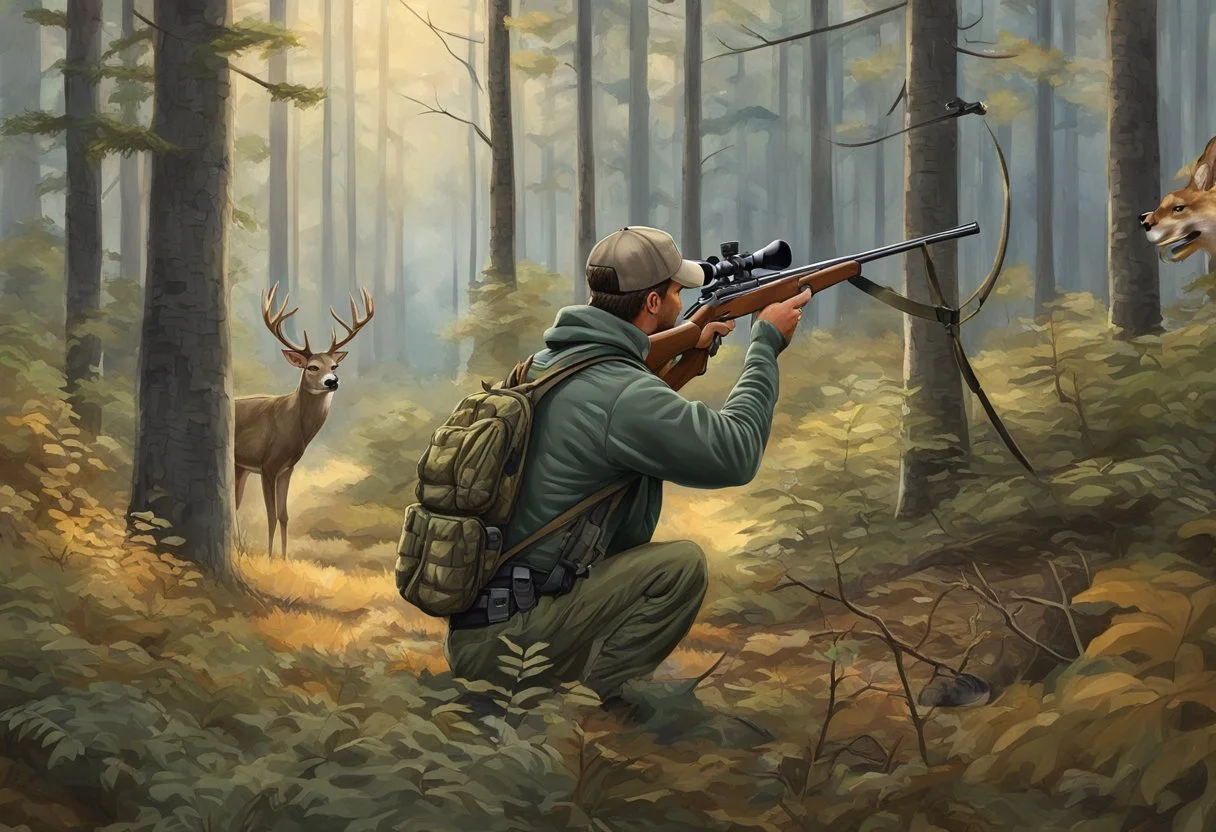Your Guide to Hunting in North Carolina
A Comprehensive Starter Guide
This Article is Part of Our Hunting Guide for All 50 US-States
North Carolina offers a diverse landscape for hunting enthusiasts, making it an ideal destination for beginners looking to get started in the sport. From the majestic Appalachian Mountains in the west to the fertile farmlands and expansive coastal regions in the east, the state provides an abundance of game animals and varied hunting opportunities. As a novice hunter, it is essential to understand the basics of hunting in North Carolina, which includes regulations, licensing, and safety precautions.
To begin, obtaining the appropriate hunting license is a crucial first step. North Carolina requires all hunters to possess a valid license, which can be purchased online, by phone, or in-person at a designated wildlife service agent. It is important to familiarize oneself with the state's hunting regulations, as each game species has specific requirements for bag limits, legal hunting methods, and designated seasons. Additionally, enrolling in a hunter education course will provide valuable knowledge on safe and ethical hunting practices.
Lastly, selecting the right equipment and gaining an understanding of the various hunting techniques will ensure a successful and enjoyable hunting experience. North Carolina boasts a multitude of game species, such as white-tailed deer, wild turkey, and various species of waterfowl. Each animal requires specific tools and strategies, so it is vital for beginners to research the most effective methods for their targeted game. Armed with this basic information, aspiring hunters in North Carolina can embark on their journey and enjoy the rich hunting heritage the state offers.
Understanding Hunting in North Carolina
North Carolina Wildlife Overview
North Carolina, also known as the Tar Heel State, is home to a diverse array of wildlife species, offering ample hunting opportunities for beginners and seasoned hunters alike. Some of the most commonly hunted animals in North Carolina include deer, turkey, bear, dove, duck, fox, and tundra swan. In addition to these species, there are many other small game animals and birds that can be hunted across the state.
Conservation Principles
Conservation plays a crucial role in maintaining the health and sustainability of North Carolina's wildlife populations. It is a key aspect of wildlife management efforts conducted by the North Carolina Wildlife Resources Commission. Both seasoned and new hunters must understand the importance of wildlife conservation in order to contribute to the long-term well-being of the species they hunt. By adhering to legal regulations and practicing responsible hunting ethics, hunters actively support wildlife conservation efforts.
Hunting Ethics and Responsibilities
Ethical hunting practices are essential to preserving the integrity of both the sport and its impact on wildlife populations. Here are some important principles that every hunter in North Carolina should adhere to:
Safety first: Completing a Hunter Education Program is a requirement for obtaining a hunting license in North Carolina. This program teaches essential information about firearm safety, hunting techniques, and hunter ethics.
Respect for the environment: Hunters should avoid causing damage to the natural habitats of wildlife, as well as minimize their impact on local ecosystems.
Fair chase: Practicing fair chase means pursuing game animals in a manner consistent with their natural behavior, allowing for a genuine and ethical pursuit.
Respect for landowners: Obtaining permission to hunt on private land is critical, and hunters should always show gratitude and respect to the landowners.
Legal Regulations and Seasons
The North Carolina Wildlife Resources Commission is responsible for setting legal regulations regarding hunting seasons, bag limits, and hunting methods. These regulations may differ for each species and region within the state. Hunters should always consult the North Carolina Hunting Regulations Guide or the Wildlife Resources Commission's website for the latest information on:
Hunting seasons
Weapon restrictions
Bag limits
Special hunting permits
Benefits of Hunting
Hunting in North Carolina, like in other parts of North America, provides a variety of benefits. Not only does it support conservation efforts, but it also offers opportunities for fun, bonding with family and friends, and learning valuable skills such as patience, responsibility, and marksmanship. By participating in the hunting community, new hunters can contribute to the long-standing tradition of responsible and ethical hunting in the Tar Heel State.
Getting Started with Hunting
Hunter Education and Certification
Before embarking on your first hunting adventure in North Carolina, it is crucial to complete a Hunter Education Course. These courses are designed to educate beginners on hunting safety, ethics, and wildlife conservation. The North Carolina Wildlife Resources Commission offers both online and classroom courses, allowing you to choose the option that best suits your schedule and learning preferences.
Upon successful completion of a hunter education course, you will receive a temporary hunter education card. This card is proof of your certification and should be carried with you while hunting. Joe DeBergalis, Executive Director of NRA General Operations, emphasizes the importance of hunter education in creating a safe and responsible hunting community.
Selecting Proper Equipment
As a beginner, selecting the right equipment is essential for a safe and enjoyable hunting experience. Start with a basic hunting gun or rifle that is suitable for your intended game and fits within your budget. More experienced hunters and sport shooters can provide guidance on the best equipment choices. Familiarize yourself with your chosen firearm and practice at a shooting range to develop your shooting skills before heading out to the field.
Where to Hunt
North Carolina offers a variety of hunting locations, catering to different types of game and hunters' preferences. Popular hunting areas include Vance, Wake, and Gaston counties. Before setting out on your first hunting trip, research the area you plan to hunt and pay attention to any specific hunting regulations or requirements.
The North Carolina Wildlife Resources Commission provides a comprehensive list of public hunting lands and guidance on seasons, bag limits, and other regulations, ensuring you have all the necessary information for a law-abiding hunting experience.
Connecting with the Hunting Community
Building a personal connection with other hunters is invaluable when starting your hunting journey. Engaging with seasoned hunters can provide you with essential safety tips, hunting techniques, and location recommendations. In addition, interacting with others who share your passion for hunting can create lifelong friendships and enriching hunting experiences.
To connect with the North Carolina hunting community, consider joining a local hunting club or participating in online forums. Connecting with family and friends who share an interest in hunting can also provide valuable support and camaraderie during your hunting adventures.
Skills and Safety
Basic Hunting Techniques
When starting out as a hunter in North Carolina, it is essential to learn some basic hunting techniques to ensure a successful and enjoyable experience. These techniques may involve understanding animal behavior, spotting signs, tracking, and learning the most effective ways to shoot. Some must-know skills for new hunters include:
Stalking: Moving stealthily and quietly while approaching prey
Still hunting: Sitting silently and watching for signs of movement
Spot and stalk: Using optics to locate prey at a distance and then formulating a plan for a closer approach
Calling: Utilizing calls or decoys to attract animals to your location
Safety Education and Best Practices
As a new hunter in North Carolina, safety should always be your primary concern. Before heading out to hunt, all hunters are required to complete a Hunter Education Course. This course is available in classroom and online formats and covers:
Firearms safety
Ethics
Wildlife conservation
Basic survival skills
Outdoor preparedness
The official website for North Carolina hunter education courses is nrahe.org. The content of these courses integrates videos, diagrams, interactive modules, audio recordings, and action photos to ensure that learners are well-equipped with the necessary knowledge to practice safe hunting.
In addition to taking a hunter education course, new hunters are urged to follow these safety best practices:
Always point your firearm in a safe direction
Treat every firearm as if it's loaded
Identify your target and surroundings before shooting
Wear blaze orange clothing to increase visibility among other hunters
Advanced Training Opportunities
After mastering the basics, hunters in North Carolina can benefit from advanced training opportunities offered by organizations like the National Rifle Association (NRA) and state-level programs. These courses provide an opportunity for hunters to:
Enhance shooting skills and accuracy
Learn advanced hunting techniques
Develop survival skills such as navigation and first aid
Participate in specialized hunts or wildlife management programs
These advanced training opportunities strive to mold responsible leaders in the hunting community and promote ethical and sustainable hunting practices. Through continued education and skills development, new hunters can become proficient in the art of hunting and contribute positively to wildlife conservation in North Carolina and the United States.
Additional Considerations
Cost and Accessibility
When considering the prospect of hunting in North Carolina, an essential factor for beginners to look into is the cost and overall accessibility. While North Carolina offers a variety of hunting opportunities, some courses and prerequisites may pose cost barriers for some interested individuals.
There is a range of free and paid courses available to enhance a person's hunting skills and knowledge. In comparison to other states, such as Connecticut, Florida, Kentucky, New Mexico, Oklahoma, Oregon, Pennsylvania, Tennessee, Texas, and West Virginia, North Carolina courses are reasonably accessible and affordable. However, some prime hunting locations or specialized courses may have a higher fee.
Here is a quick comparison of different states' hunting course costs:
State Hunting Course Cost North Carolina $15-60 (residents), $40-120 (non-residents) Connecticut $19 (residents), $65 (non-residents) Florida Free of charge Kentucky $30 (residents), $150 (non-residents) Texas $15 (residents), $315 (non-residents) Oregon $30 (residents), $167.75 (non-residents)
As demonstrated in the table, North Carolina offers moderate pricing in comparison to other states mentioned. Regardless of your budget, beginners should always prioritize safety, legality, and ethical considerations when entering the field.
Preparing for the Field
Before venturing into the wild, beginners must ensure they are adequately prepared for the hunting experience. Obtaining the prerequisite skills and knowledge is essential for a successful and safe hunt.
Some aspects of field preparation include:
Research: Understanding the hunting landscape in North Carolina is crucial for success. Learn about the different types of animals you may encounter, their habitats, and behaviors.
Equipment: Invest in quality gear such as firearms, ammunition, clothing, and other essentials suitable for your specific hunting activity.
Fitness: A certain level of physical fitness is necessary, as hunting can involve long walks and carrying equipment.
Safety: Complete a hunter education course, which covers essential safety practices, laws, and regulations associated with hunting.
North Carolina offers various resources for educating and preparing beginners for the field. Overall, with adequate research, proper equipment, physical fitness, and adherence to safety guidelines, beginners can confidently step into the world of hunting in North Carolina.
Conclusion
Hunting in North Carolina offers a great opportunity for beginners to immerse themselves in the outdoors. To make the most of the experience, keep the following reminders in mind:
Safety: Adhere to all safety rules, regulations, and guidelines. Take a hunter education course if required.
Licenses and Permits: Secure the necessary hunting licenses and permits beforehand.
Seasons and Regulations: Familiarize yourself with game species, hunting seasons, and specific regulations for each.
Remember to respect the environment, animals, and fellow hunters, and practice responsible hunting techniques. Although beginners face many challenges, opportunities abound in North Carolina to enjoy and appreciate the great outdoors through hunting.




